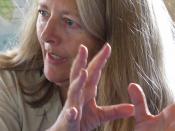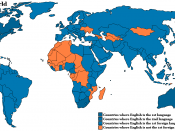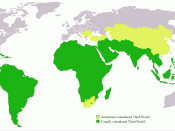Valentina Gjoni
Eng: 004
04/22/03
Professor: Janet Oliver
Enlightens or Darknesses
Technology is not the most important factor in our lives. Every one of us that emigrated from poor countries experienced a non advanced technology world. It did not nuisance us because we did not know the existence of the high quality machines or anything related with technology. The two stories describe the life of the Third World countries in different views at some points but the same on others. Norberg-Hodge and Pitroda argued about the advantages and disadvantages of the technology influences on other people lives.
Based on the story "Nothing is Black, Nothing is White" Norberg-Hodge give us the view of life were everything is primitive and her opinion of people could live happier than now. The natives of the Ladakh do not have luxury. They survive the same way as many years ago "with basic comforts." ( Norberg-Hodge 195) In the winter they do not use heat.
The water does not come in every house; the Ladakhis have to "fetch water every day from a stream." ( Norberg-Hodge 195) Also the cooking is not made by the stove but from "a dung fire." (Norberg-Hodge 195) The natives did not know the existence of center or north from the city for them it meant the same. The medicine part is very hard because the children die from diseases that in the advanced world can be cured. It is sad to hear that the children in Third World countries die only because of their poverty and the traditional ways.Another fact that Norberg-Hodges argues is for the literacy. She describes the people as illiteracies but also at the same time she does not show any anger or make her feel that is ignorance. She admits that for their world is not called "powerless" but its part of their "traditional culture." (Norberg-Hodges195)
The traditional side is good in the natives and author' eyes but technology would make their lives more comfortable and beneficial. For example the Ladakhis now have the chance to visit other places and import from them the three basics foods in the human live "sugar, rice, once luxuries, have become the food of every day."
( Norberg-Hodge) The education will provide them "with new and exciting opportunities." ( Norberg-Hodge 196) The natives will have the chance to think based on theories and listen to their leader but not believe everything. Also would improve the lifestyle and their perspectives of "the way to live the life"
On the other hand, in the story "Development, Democracy, and the Village Telephone" we have a born and raised person who thinks that his country is very poor and needs a lot of improvement especially technologically but he also argues that the natives need only the basics. Sam (Satyan) Pitroda lived most of his life in a small village in India but this did not stop him to get educated and one day to help improve his patriots. Even though he is an USA citizen he still believes that the Indians need only "immunizations, basic literacy, disease- and drought-resistant cereals and oilseeds, simple pumps, deep-drop toilets, two-phase electrification." (Pitroda 201) These all are the "appropriate' technology that will need for a normal life. As I went through the reading Pitroda did not agree with himself because once says they need the basics and after describes how the advanced technology will make their life better. Continuing and explaining how the agriculture life will change, the water sourcing, the sanitation, construction factors that will build a country on positive ways. He also has a great point about the telecommunication how important and flexible has been now that most of the villages can communicate without having to travel. The owner could contact with his employees by telephone "monitor the movement of his vehicles." (Pitroda 202) To place orders, to contact vendors or even to send messages. The telecommunication services gave to most of the cities the service that was needed and Pitroda did that. The goal of his life was accomplished for the good of his own people.
Two writers presented a picture of the Third World countries and how the technology influenced on these countries. Norberg-Hodge preferred to live in this primitive life and Pitroda chose the technology but at the certain point of it. Is it really important to our live? My answer is that we advance the technology for easiest life, without having to get through the difficulties that our parents or grandparents had to get through. Live the life the way that you enjoyed let the others decide for theirs.
Bibliography
Smalzer R. William, Write to be Read. Cambridge University Press, 1996
Smalzer R. William Write to be Read. "Nothing is Black, Nothing is White" Norberg-Hodge
Cambridge University Press, 1996
Smalzer R. William Write to be Read "Development, Democracy, and the Village Telephone" Sam (Satyan) Pitroda




